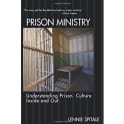Jail & Prison Ministry
Recommended Books
Prison Ministry: Understanding Prison Culture Inside and Out by Lennie Spitale

Reading the Bible with the Damned by Bob Ekblad
Annotated Bibliography Evidence-based practices “What Is the Evidence? Evidence-based policy and practice is focused on reducing offender risk, which in turn reduces new crime and improves public safety. Of the many available approaches to community supervision, a few core principles stand out as proven risk reduction strategies. Though not all of the principles are supported by the same weight of evidence, each has been proven to influence positive behavior change. To organize the research, these core principles have been compiled… into the 8 Principles of evidence-based practice in corrections. This bibliography is not a complete list of “EBP” citations, but a mere selection based on questions we receive at the Information Center. They are organized according to: Introduction; In the Beginning; Principles 1 and 3. Assess Risk and Needs and Target Interventions–Risk, Need, Responsivity (RNR), and Dosage; Principle 2. Enhance Motivation to Change; Principle 4. Skill Training with Directed Practice (CBT); Principle 5. Increase Positive Reinforcement (See Incentives and Sanctions/Contingency Management); Principle 6. Engage Ongoing Community Support; Principles 7 & 8. Measure Relevant Processes and Practices and Measurement Feedback; Blueprints Programs; Caseload Size; Evaluated Programs, including Core Correctional Practices (CCP); Incentives and Sanctions/Contingency Management; Juveniles; Pretrial Services; Prisons; Sex Offenders; Specialized Assessment; Specialty Courts; Supervision by Risk Level; Women Offenders; Training Materials/Presentations; Websites; and Agency Reports.
How Financial Literacy can Assist Offender Rehabilitation by Tyson Howard “By providing financial literacy education to offenders, we can help them learn a way to secure a better future for themselves and their families.”
5 Facets in Spiritual Formation Every person, at some point in life, must decide whether or not to receive Jesus Christ as his or her personal Lord and Savior. But that is just the starting point of a lifelong journey in discipleship as a follower of Jesus. As the apostle Paul says, we are to grow mature in Christ. We grow up into the head of the Body, who is Christ (Eph. 4:15). Such “growing up” is the process of spiritual formation.
National Endowment for Financial Education: Free resources to help you teach money management skills.
Criminal Justice and the Church (a powerpoint presentation by Dr. Karen Swanson)
Changing Course: Preventing Gang Membership–Full Report
Office for Victims of Crime Training and Technical Assistance Center
Probation and Parole in the United States, 2016 (BJS)
Capital Punishment 2016 report
Correctional Populations in the United States 2016 (BJS)
5 out of 6 state prisoners were arrested within 9 years of their release (BJS)
National Inventory of the Collateral Consequences of Conviction
One of the areas to help the incarcerated grow in their faith is to teach foundational Christian beliefs. Essentials is a tool to assist you in that effort: Essentials – Teaching Foundational Christian Beliefs
Answering the Call is a curriculum to equip Christians behind the walls to live focused lives of witness and discipleship. These Christians are the best to reach their community. Trainer Certification is now available through the Institute for Prison Ministries at www.prisoninstitute.com
Leading worship services inside correctional facilities resources and Worship grant information.
Prison Mission Association offers free Bible lessons in English & Spanish to inmates for college credit: Over 32,000 students now in all 50 states. Contact the website if interested. A weekly radio show, Prison Transformation Radio, provides podcasts available on the www.prisonmission.org/media site. Over 50 podcasts are currently produced.
Week One – a free discipleship resource for new believers by Claude King
This booklet is written to help new Christians take some first steps during their first week as a new believer. Week One: Taking Your First Steps as a Follower of Jesus Christ. The booklet was designed so those in your church could give it to people making a decision for Christ with encouragement to “start today.” It includes a coaching process so that disciplers can discuss questions with a more mature believer. Ideally, new believers who use this resource will move immediately into a connection with a Bible study group and continue growing as disciples.
Week One – high resolution is formatted so you can print it two-sided on letter-sized paper, head to head, and fold it into a 20-page booklet (5.5″ x 8.5″). The cover is high resolution.
Week One – low resolution is formatted with the 5.5″ x 8.5″ pages arranged in serial order, 2 to a page with a lower resolution cover.
The daily devotionals include:
Day 1: Understanding this New Life
Day 2: Spend Time with God Daily
Day 3: Learn about God, His Will & Ways
Day 4: Live in Victory
Day 5: Connect with the Body
Day 6: Tell Your Story
Day 7: Plan and Take Next Steps
You are free to share these discipleship guides with others so they can print and use them in their own ministries.
The following articles are found in the Members Section of the CMCA Website.
Women
- Faith-Based Programming for Justice-Involved Women: Lifelines Powerpoint
- Faith-Based Programming for Justice-Involved Women: Lifelines Handout
- More Resources for Ministry to Women

